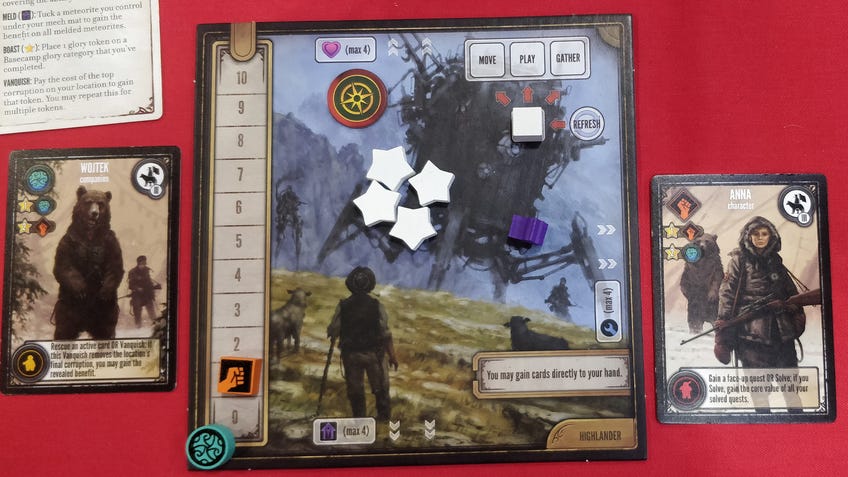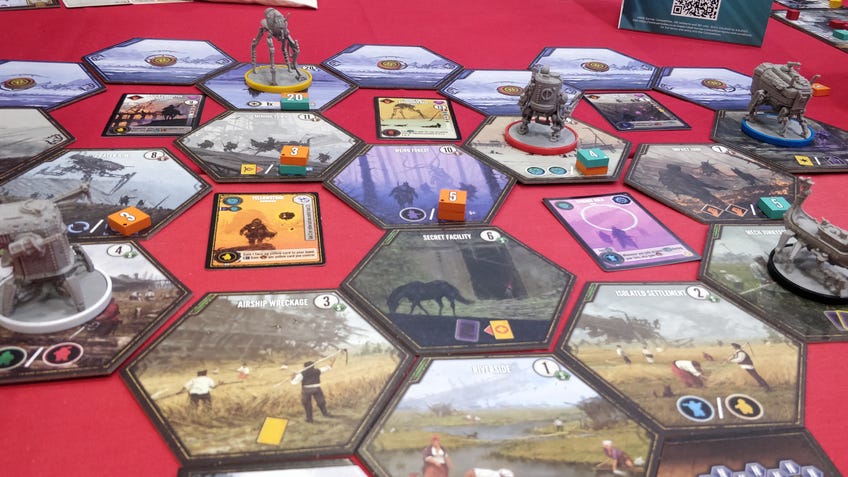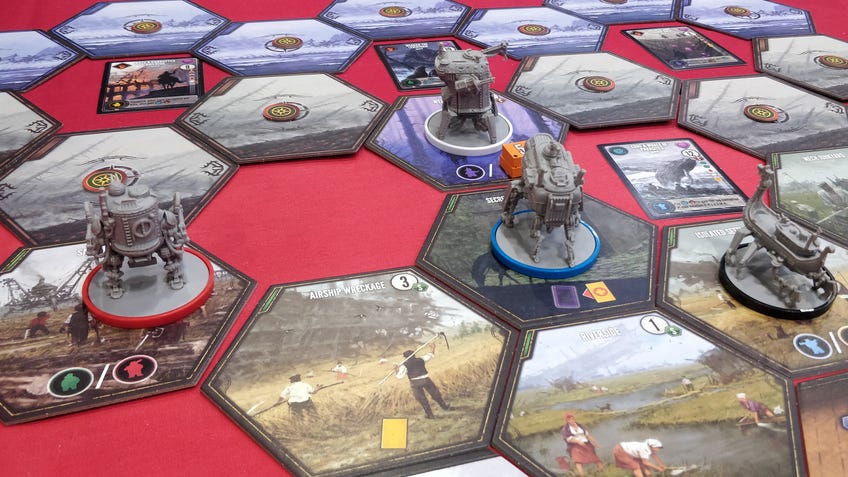Scythe spin-off Expeditions feels more like a missed opportunity than a direct sequel – hands-on preview
Not exactly meteoric.
Dicebreaker had the opportunity to play a demo of Expeditions, the upcoming board game that’s touted as a sequel to Scythe, at this year’s UK Games Expo. Initially announced in February, Expeditions takes place in the same universe as Scythe – which is itself based on artist Jakib Rozalski’s 1920 + setting - but after the conclusion of the original board game’s Great War. Though Expeditions is referred to as ‘A sequel to Scythe’ it feels more like a spin-off that doesn’t take advantage of the fascinating world it’s set in.
The demo we played took place over an hour, which was not nearly enough time to get a proper grasp on how Expeditions works. However, it was plenty of time to conclude that this is the least interesting direction for the Scythe series to go in.
Players are greeted with a snappy little introduction in the Expeditions rulebook briefly detailing the events leading up to this title, as well as its general premise. With the Great War of Europa – an alternate version of our own Europe – now over, the people live in peace. However, after a meteorite smashes into Siberia, all manner of strange and creepy creatures begin roaming the countryside, attacking innocent people. As heroes from the Great War, players fund their own expedition into Siberia to save civilians and seek out the truth.

Though the sci-fi/horror vibes of Expeditions offer a very different flavour from Scythe’s historical/dieselpunk aesthetic, I’m not sure it’s the best spin to put on this universe. One of the strongest aspects of the original Scythe is how unique its world feels, largely thanks to its early 1900s imagery that had just enough of a science-fiction twist to indicate this wasn’t historically accurate. I love the images of the incredibly ordinary, pastoral environments being invaded by these strange, gargantuan machines – almost like it’s a parody on those super serious historical board games. However, it feels like Expeditions’ monster/parasite/alien themes push the worldbuilding too far into the surreal, losing the uniqueness of the original.
Though different from the original Scythe in various ways, Expeditions’ core gameplay tenants remain identical.
Scythe is known for its unusual approach to worldbuilding and storytelling, with the various cards, components and artwork for the game giving players clues into its universe. This approach really works considering that Scythe is primarily about devising strategies to beat your opponents with, rather than telling an epic narrative. However, I can’t help but feel that Expeditions wastes an opportunity with its continued devotion to this hands-off approach. Whilst players get a little more story through the increased importance of quests in Expeditions, the focus is still on strategy over narrative.
If Expeditions had placed a greater emphasis on exploration, storytelling and character development – somewhere along the lines of Eldritch Horror or Sleeping Gods – it could have provided players with not just an opportunity to learn more about Scythe’s intriguing world, but also offered a vastly different experience from the original game. Though different from the original Scythe in various ways, Expeditions’ core gameplay tenants remain identical: planning ahead so you can juggle many balls.
Players’ primary goal in Expeditions is to have the most money by the end of the game, with the methods of obtaining money being multitudinous. Whilst the very first turn enables players to do all three of the main core actions – move, play and gather – future turns require players to place a cube over one of these actions and only perform the other two, like a streamlined version of Scythe’s gameplay system. Alternatively, players can choose to refresh, which will enable them to perform all three actions on their next turn, as well as regaining any cards or workers played.
Throughout the game, players will move their mech across the board – made up of a collection of hexes – gathering resources, completing quests, removing corruption and gaining wealth and glory. Every playthrough will begin with a few hexes being overturned, revealing their location and what resources players can gain there. As players further explore the board, they’ll turn over tiles that will contain a certain amount of corruption. This corruption represents the various beasties and strange occurrences brought about by the meteor’s arrival, with players needing to spend guile – one of the game’s main resources – in order to vanquish it.
Expeditions doesn’t have enough unique elements to stop it from falling into the uninspiring eurogame trap.
Vanquishing corruption will not only grant the players tokens, which they can exchange for money at the end of the game, but can also help them to fulfill one of the glory categories in Expeditions – which are worth additional money. Players can acquire guile in a number of ways, including gathering it from hexes on the map or playing cards into their active slot. The other main resource is power, which can be obtained in similar ways to guile. These two resources can also be used to complete the quests that will pop up across the map. Completing quests will gain players various benefits, as well as go towards a glory category. Though the flavour text and artwork for quests will vary, solving them always involves paying resources – which feels like a very underwhelming way to interact with a ‘quest’.

As players vanquish corruption and complete quests, they’ll gain cards that that can be used to gain additional resources, as well as an extra ability that can be unlocked via workers. Players will find workers as a board resource and can place them on a card they put into their active slot. Expeditions features a variety of cards, but only item cards can be upgraded to provide players with permanent benefits. Any meteorite cards players have can be ‘melded’ to give their owners active bonuses for the rest of the game as well. Both of these actions will also count towards glory categories.
I wish Expeditions would just fully commit to being a narrative co-op board game.
Just like Scythe, Expeditions is a board game about picking a potential victory path from a variety of different options. The big difference here is that, unlike Scythe, Expeditions does not support any direct player-versus-player action. Whereas players in Scythe could instigate battles with an opponent to secure their dominance over a specific hex, protect their resources/buildings or acquire victory stars, Expeditions doesn’t feature any battle or combat gameplay mechanics. Despite Scythe being more of a game about resource management and goal planning, its battle mechanics always kept players on their toes in a way that stopped it from feeling like just another eurogame. Comparatively, Expeditions doesn’t have enough unique elements to stop it from falling into the uninspiring eurogame trap, with players solely focusing on their own little corners and not really needing to bother with anyone else.
I wish Expeditions would just fully commit to being a narrative co-op board game, with players working exploring the world and solving quests together – rather than playing this strange, less exciting version of Scythe. I guess I’ll have to wait to get a proper Scythe sequel or the narrative Scythe co-op board game I’ve been waiting for, because Expeditions is neither of those things.

